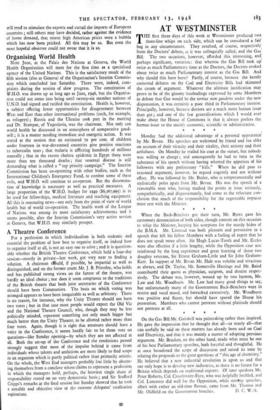A Theatre Conference
For a profession in which individualism is both endemic and essential the problem of how best to organise itself, or indeed how to organise itself at all, is not an easy one to solve ; and it is question- able whether the British Theatre Conference, which held a four-day session—mostly in private—last week, got very near to finding a solution. A chairman slituld, if possible, be impartial as well as distinguished, and on the former count Mr. J. B. Priestley, who holds and has published strong views on the future of the theatre, was hardly an ideal choice ; nor does it seem congruous to the traditions of the British theatre that both joint secretaries of the Conference should have been Communists. The basis on which voting was arranged appears to have been inequitable as well as arbitrary. There is no reason, for instance, why the Unity Theatre should not have two votes ; but in that case most people would expect the Old Vic and the National Theatre Council, who, though they may be less politically minded, represent something not only much bigger but much better than the Unity Theatre, to be allotted rather more than four votes. Again, though it is right that amateurs should have a voice in the Conference, it seems hardly fair to let them vote on questions—like Sunday opening—by which they are not affected at all. Both the set-up of the Conference and the resolutions passed strongly suggest that most of the impulse behind it came from individuals whose talents and ambitions are more likely to find scope in an organism which is partly political rather than primarily artistic. On the whole, the West End managers probably lost little by absent- ing themselves from a conclave whose claims to represent a profession in which the managers hold, perhaps, the heaviest single share of responsibility rested on no very democratic basis ; and Sir Stafford Cripps's remarks at the final session last Sunday showed that he took a sensible and objective view ot tlyt extreme delegates' totalitarian aspirations.


































 Previous page
Previous page